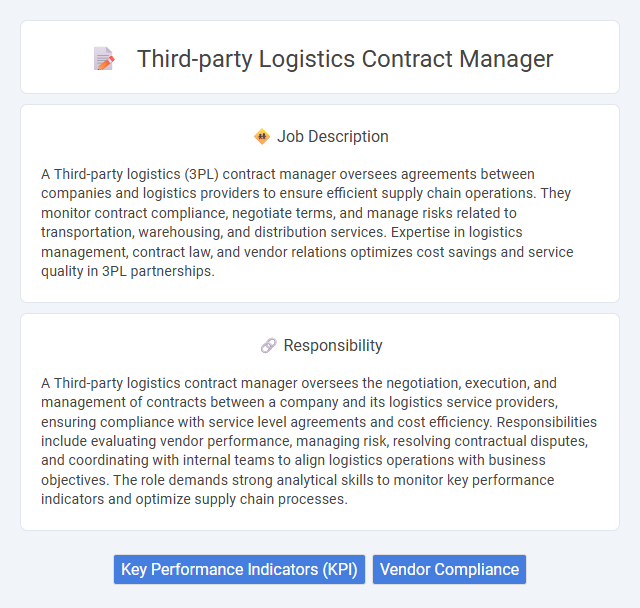
A Third-party logistics (3PL) contract manager oversees agreements between companies and logistics providers to ensure efficient supply chain operations. They monitor contract compliance, negotiate terms, and manage risks related to transportation, warehousing, and distribution services. Expertise in logistics management, contract law, and vendor relations optimizes cost savings and service quality in 3PL partnerships.
Individuals with strong organizational skills and experience in supply chain management are likely suitable for a third-party logistics contract manager role. Those comfortable negotiating contracts and coordinating between multiple stakeholders may find this position aligns well with their abilities. Candidates less adept at multitasking or managing complex relationships might face challenges in meeting job demands.
Qualification
A Third-party logistics (3PL) contract manager requires strong expertise in supply chain management, vendor negotiations, and contract law to effectively oversee service agreements with logistics providers. Proven experience in analyzing and optimizing contract terms, managing compliance, and mitigating risks is essential for maintaining cost efficiency and operational excellence. Advanced skills in communication, project management, and data analysis support seamless coordination between internal teams and external logistics partners.
Responsibility
A Third-party logistics contract manager oversees the negotiation, execution, and management of contracts between a company and its logistics service providers, ensuring compliance with service level agreements and cost efficiency. Responsibilities include evaluating vendor performance, managing risk, resolving contractual disputes, and coordinating with internal teams to align logistics operations with business objectives. The role demands strong analytical skills to monitor key performance indicators and optimize supply chain processes.
Benefit
A Third-party logistics contract manager likely improves supply chain efficiency by overseeing vendor agreements and ensuring compliance with service level expectations. This role probably reduces operational costs through optimized contract terms and risk management, enhancing overall profitability. Effective management of logistics partnerships may also increase customer satisfaction by ensuring timely and accurate delivery of goods.
Challenge
Managing third-party logistics contracts likely involves navigating complex service-level agreements and ensuring compliance with diverse regulatory standards, which can present considerable challenges. The probability of encountering disputes over performance metrics may require strong negotiation and problem-solving skills to maintain effective partnerships. Effective communication and risk mitigation strategies are probably essential to handle the dynamic nature of supply chain disruptions in this role.
Career Advancement
A Third-party logistics contract manager plays a pivotal role in overseeing agreements between companies and logistics providers, ensuring efficient supply chain operations and compliance with contractual terms. Expertise in negotiation, risk management, and performance analysis positions professionals for advancement into senior management roles such as director of logistics or supply chain operations. Developing skills in data analytics and technology integration further accelerates career growth within the expanding logistics sector.
Key Terms
Key Performance Indicators (KPI)
A Third-party logistics (3PL) contract manager is responsible for overseeing logistics agreements ensuring compliance with service level agreements (SLAs) and operational standards. Key Performance Indicators (KPIs) for this role typically include on-time delivery rates, order accuracy, transportation cost per unit, and inventory turnover ratios. Monitoring these KPIs enables effective contract performance evaluation, risk mitigation, and continuous improvement in supply chain efficiency.
Vendor Compliance
A Third-party logistics contract manager specializes in overseeing vendor compliance to ensure adherence to service level agreements and regulatory requirements. Responsibilities include monitoring performance metrics, conducting audits, and implementing corrective actions to optimize supply chain efficiency. Effective vendor compliance management reduces risks, improves delivery accuracy, and drives operational excellence in logistics partnerships.
 kuljobs.com
kuljobs.com